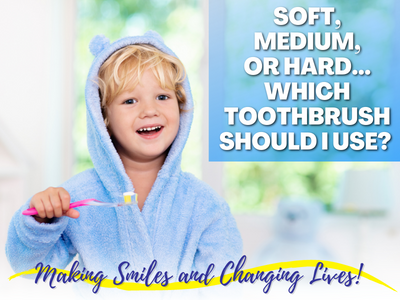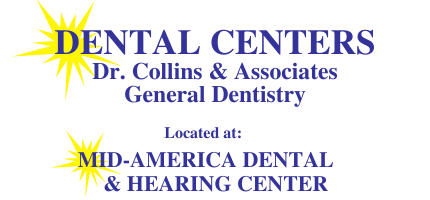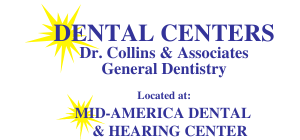Our Dental Blog

Soft, Medium, or Hard? Which Toothbrush Should I Use?
It can be overwhelming to choose the best type of toothbrush when there is a sea of choices in convenient stores and online. There are several brands that all market the best handle, bristles, and how they can benefit your oral health. While all toothbrushes aren’t created equally, bristle strength is one of the most important factors to look at when choosing a new brush.
How do you know which is best for you? Dentists recommend choosing a toothbrush with soft bristles because they are gentle on the gums and tooth enamel. Here is a simple breakdown about soft, medium, and hard bristle toothbrushes and how they can affect your teeth.
Soft Bristles
Nearly all dentists recommend a soft bristle toothbrush. In fact, if you can pick a toothbrush with extra soft bristles, it is even more beneficial. This is because a brush with soft bristles won’t harm your gums and cause bleeding or irritation. A soft brush will also be gentle on your tooth enamel and won’t cause wearing away that is responsible for sensitivity and pain.
Remember, you can’t get back lost gum tissue that is worn away from brushing too hard, so when opting for a toothbrush, look for one with soft bristles. It will help maintain your gums and tooth structure so there is less chance of roots or dentin being exposed leaving you with a sharp pain from temperature changes.
Medium Bristles
Medium bristle toothbrushes are not generally recommended by dental professionals. They are a bit stiffer than a soft toothbrush, but softer than a hard one. Most people will brush too hard around their gums and teeth and can cause damage if not used properly. If you prefer to use a medium bristle toothbrush, speak with your dentist and hygienist about the proper brushing technique so you don’t cause any injury to your smile.
Hard Bristles
It is rare to find a hard bristle toothbrush anymore by a reputable toothbrush company because they are more likely to cause damage to your gum area and tooth enamel. Hard bristles can effectively remove plaque and food debris but are too hard on natural teeth.
Some people prefer to use a medium or hard bristle toothbrush on false teeth like appliances including partial dentures, dentures, nightguards, or clear aligners. While a medium or hard bristle brush can remove debris, it is best to speak with your dental professional if it is safe, so you don’t damage your expensive appliance.
When people use a toothbrush that has medium or hard bristles and it causes pain and sensitivity, it is more likely for people to avoid brushing because of discomfort. Many people don’t understand that brushing harder does not mean brushing better. Instead, these types of brushes are more likely to do more harm than good.
How to choose the best toothbrush
The best way to choose the right toothbrush for you is to ask your dentist or hygienist next time you have a dental appointment. They can guide you in the right direction based on your oral health needs.
Some patients require a soft bristle brush, but there are brands that have different features like for gum sensitivity or whitening care. There are so many factors to consider when choosing a brush like whether you want a manual or electric brush. Do your research and try out a few to see which help you do the best job to remove plaque.
Gum disease and tooth decay are important things to avoid, but you want to use a brush that won’t cause further damage in your mouth.
Brushing tips
The American Dental Association recommends that everyone brush twice a day for two minutes each session. This ensures you can remove as much plaque and hopefully remain cavity free. Flossing and rinsing with a fluoride rinse is also beneficial to maintain good oral health.
Use a low abrasive fluoride toothpaste to prevent enamel erosion and sensitivity.
Brush at a 45-degree angle in tiny circles on the outsides and insides to guarantee you reached all difficult areas. Also, remember to replace your toothbrush every 3 months or sooner if you notice bristles are worn down and flat.
The Verdict
While there are many types of toothbrushes to choose from, you should always look for one with soft or extra soft bristles. A soft bristle toothbrush is the best option because it effectively removes plaque, food, and bacteria debris, but is not hard enough to damage teeth and gums when being used. The next time you are looking for a new toothbrush, remember to opt for one that is soft bristled and that is ADA approved. Always use the right brushing technique, regardless of the brush, to ensure you are doing the best job to keep up with your oral hygiene.
Blog Archive

